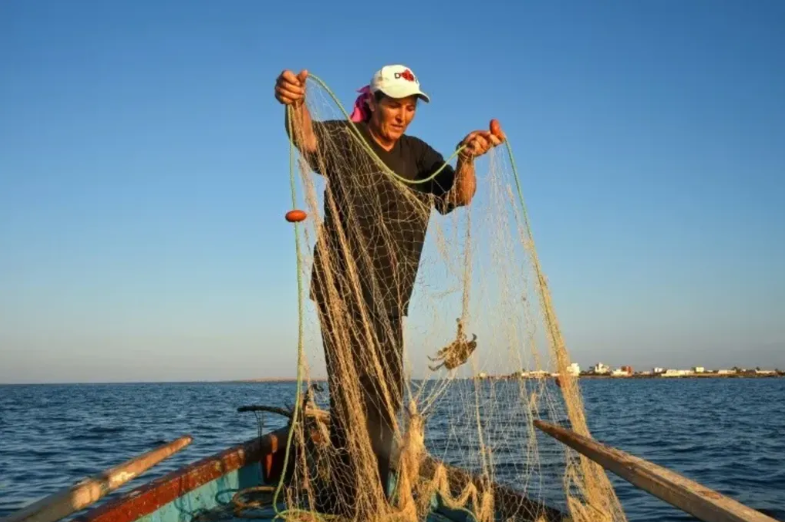Off the flat coast of the Kerkennah Islands in Tunisia, Sara Souissi rows out to sea in her small fishing boat. As one of the few women in a male-dominated profession, she fights against gender stereotypes and environmental challenges that threaten her livelihood.
« I love the sea and I love fishing, which is why I’ve persevered, even though society doesn’t fully accept a woman as a fisher, » says Ms. Souissi, 43, who has pursued this passion since her teenage years.
In this vital sector in Tunisia, which accounts for about 13% of the GDP, including aquaculture, women play « an active and varied role throughout » the industry, albeit one that is often unrecognized, according to a recent study by the Food and Agriculture Organization (FAO) of the United Nations.
While there are no statistics detailing their exact representation among the total of 44,000 fishers in 2023, as reported by the National Observatory of Agriculture, it is noted that 60% of those working in the informal economy are women.
Women fishers « are often not considered real workers » by their male counterparts and have less access to assistance, training, and financial institutions, which classify them as « high-risk borrowers, » according to the FAO.
Those who work alongside male family members are, partly due to legislation that disadvantages them regarding property rights, often « seen as unpaid family helpers, » the study indicates.
In Raoued, north of Tunis, the Sustainable Fishing Association (TSSF) conducted a training session for women in fishing professions in June. « The idea is to create additional resources (for families) while adapting to the context of climate change, decreasing marine resources, and poor fishing practices, » explains Ryma Moussaoui, the workshop coordinator.
However, on that day, most women primarily aim to assist the men in their lives. « My husband and my father are fishers, » says Safa Ben Khalifa, a participant, who sees her main contribution as « making fishing nets. »
Climate change
In contrast, Sara Souissi values her independence and takes pride in her contribution to the household she shares with her husband, who is also a fisher, and their child.
Beyond gender stereotypes, she faces challenges such as the warming oceans that are severely affecting her archipelago, located 300 km south of Tunis. In August, the Mediterranean reached record temperatures, averaging 28.9 degrees Celsius, rendering its waters uninhabitable for some species.
Along Tunisia’s 1,300 km coastline, pressure on marine life is exacerbated by overfishing and unsustainable practices, such as the use of plastic traps to catch fish and pelagic trawlers that rake the seabed, destroying seagrass beds that serve as breeding grounds and nurseries for fish.
« They don’t respect the rules; they catch everything they can, even outside of the allowed fishing periods, » Ms. Souissi laments, wearing a white cap, referring to some of her colleagues.
Another major issue is pollution.
To the south of the Kerkennah Islands, clam gatherers formed an association in 2017 to develop this activity in Skhira, located in the Gulf of Gabès, 350 km south of Tunis.
« No other jobs »
The association enabled around forty women « to free themselves from the intermediaries » they previously relied on to export to Europe, receiving only a fraction of the final sale price, explains Houda Mansour, its president.
However, in 2020, due to declining populations of this seafood, decimated by pollution and climate change, the government banned collection, and the association had to shut down.
« They don’t have diplomas and can’t find other jobs, » emphasizes Ms. Mansour, who has since transitioned to pastry making.
Clams are not the only species suffering from the polluted and overheated waters of the Gulf of Gabès, which have « become unfavorable to fish life, » according to Emna Benkahla, a researcher at El Manar University in Tunis. She asserts that efforts must be made toward more sustainable fishing practices, as the widespread decline in fishery resources will « undoubtedly worsen unemployment. »
With her non-motorized boat and small nets, Ms. Souissi stands as a pioneer and has no intention of giving up her profession: « Stay at home and do housework? No way, I want to keep fishing. »
Source: lecourrier



